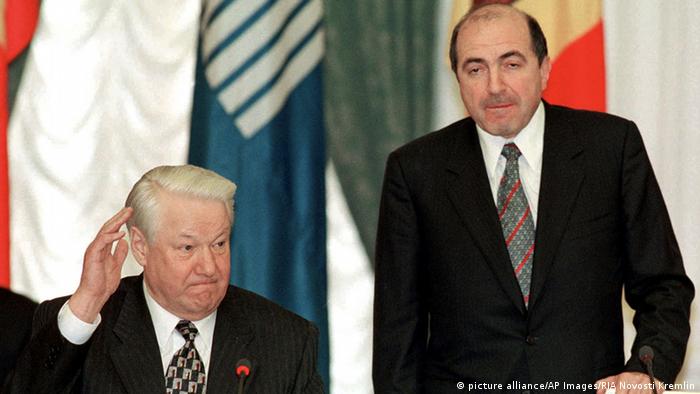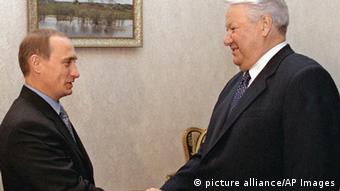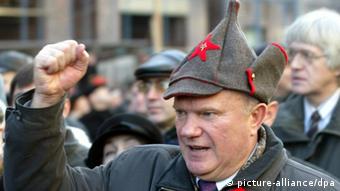Russia
Yeltsin’s Pact with the oligarchs
20 years ago, Boris Yeltsin was elected Russian President again. For his electoral success, he entered into an unholy Alliance with the Russian oligarchs. Thus he laid the Foundation stone for today’s Russia.

Boris Yeltsin (left) in 1998 with the oligarch Boris Berezovsky
The choice has been two decades, but it has a lasting effect until today: On 3. July 1996 was selected by Boris Yeltsin in the second round with 53.8 percent of the votes. He won with a lead of around 13 percentage points ahead of his Challenger, the Communist leader, Gennady Zyuganov. Such a clear result was before the election.
Manfred Sapper, editor-in-chief of the magazine Eastern Europe, in his opinion, there was it in 1996 to a shoulder-to-shoulder between politicians and oligarchs. This was “one of the crucial choices” for today’s Russia. “This has impacted the relationship between the independent media and politics unbelievable,” said Sapper in an interview with Deutsche Welle. Pluralism in the media landscape did not exist: Only to the extent that the various oligarch controlled by different TV channels. “The sound is equal, and absolutely identical reports in the different television channels. This was not intended, but in the core that was the starting point for a development that resonates in today”, says Sapper.

Not eye-to-eye: Putin and Yeltsin in 1999
Unemployment and Hyperinflation
In the mid-1990s, Russia experienced strong changes. In December 1993 a new Constitution was adopted. A democratic society has a written procedure and in place of the planned economy, the market was introduced in the economy. In addition, the observance of human rights was proclaimed. But at the same time, many Russians lost their jobs and were unable to live of their money that was devalued by the Hyperinflation.
The radical reforms in economy and politics had “been at the Desk convincing” planned, but they had led to a “rapid economic recovery”, said Gerhard Simon of the University of Cologne. In the result, Yeltsin lost massively to consent. Of his opponent, the Communist Gennady Zyuganov with his Anti-reform benefited from the program.
Oligarchs start campaign for Yeltsin
However, a Few – including the oligarchs – profited in the midst of economically difficult times financially, often thanks to a Mix of skill and ruthlessness. Due to their economic impact, you designed increasingly the policy. They were afraid of a return to the Communist Soviet Union and the loss of their assets. To prevent this, they formed themselves. In the hands of the major media of the country, it was Easy for you to start a campaign in support of Boris Yeltsin.

CPRF Chairman Gennady Zyuganov in the year 2003
Gemma Pörzgen, Board member of reporters without borders, says at the time, had feared a much larger restriction of freedom: “we wanted To prevent a relapse into communism. There was no discussion of the freedom of the press, which was true under Yeltsin, and it was only with the coming to power of Putin’s departure became more and more restricted,” she said to the DW. The danger of an electoral victory of the Communists at that time was for many of the journalists are very real. “If you look today, there was a confusion of the roles. Many journalists have positioned themselves against the Communists and in favor of Yeltsin, but it is their journalistic duty to report as neutral as possible,” recalls Pörzgen.
“Yeltsin was the lesser of two Evils, compared to Zyuganov and from today’s perspective, the lesser Evil, compared to Putin,” writes Gerhard Simon of the University of Cologne. We have decided for a “carry on in the direction of democratic development of Russia”. Finally, Yeltsin did not affect the freedom of the press. For all the criticism he was not the man, “the Opposition wanted to basically turn off,” says Simon.
In the stranglehold of the oligarchs
The Pact with the oligarchs secured Yeltsin’s re-election. The Communists lost more and more importance. But Yeltsin was not able to pursue the democratization and its pupils are not in check. The health of the weak and politically in the Dignity of the oligarchs he had his preferred candidate
Boris Nemtsov fall and appointed in August 1999, Vladimir Putin, a pupil of the oligarch Boris Berezovsky to his successor.
Putin continued Yeltsin’s reforms. He extruded some of the oligarchs from politics, and replaced it with their own friends. Russia was under his presidency increasingly authoritarian and anti-liberal. The bases were not created by Putin alone. They were laid out in the presidential election in 1996. Eastern Europe-editor-in-chief Manfred Sapper, however, to bear in mind: “the fact is that no one looked to a master plan for the Reform of a strong military, multi-national Empire. It was carried out according to the principle of trial and error.”